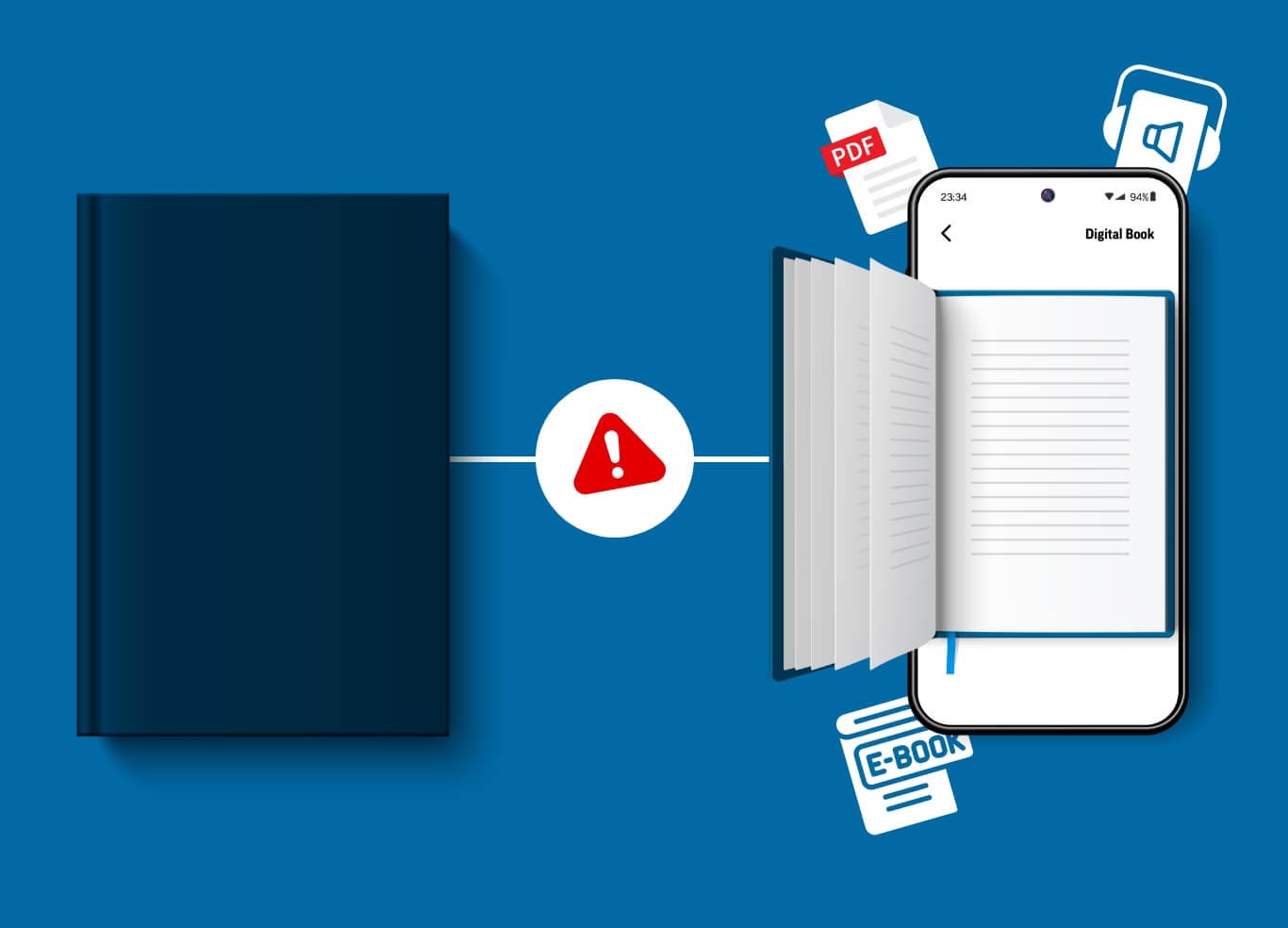Over the past few years, digitization has become a transformative approach globally. With technology evolving continuously, every piece of information available in physical form is being converted into a digital format, given the numerous benefits. Today, it has become a significant approach to storing data, making it readily available for long-term preservation and more. As the world has become more digitized, approaches have become digital, making them easier, more efficient, and quickly accessible.
Businesses have been leveraging the power of digital transformation that has enabled experts and professionals to convert physical files into digital formats. Conversion of physical copies to digital copies has been beneficial for companies in many aspects and has accelerated daily operations. From investing crucial time in finding accurate information to having access to data within a few clicks, the entire business landscape has undergone significant evolution with digitization.
Speaking of the vast amount of data and information available, books are a significant part of traditional information storage. As a matter of fact, over the last few years, technology and innovation have altered the approach of data keeping in every sector. Considering books of various kinds, such as history and maps, as vital parts of data, book digitization is a comprehensive approach in the modern era. Book digitization has recently become common among publishing houses, educational sectors, libraries, and more. It is an integral part of data digitization, which has been the essence of digitization for professionals. Digitization approaches in various sectors have streamlined daily operations and enhanced workflow efficiency. Every single piece of information is considered a significant part of business as data. Books are also a vital aspect, especially for the education sector.
Moreover, not only is the education industry important, but preserving rare books that showcase traditions, culture, and more is also meant to be kept for generations to witness. Over time, books become fragile due to paper deterioration, environmental factors, and other factors. It is essential to preserve rare books written by ancestors, as they are a significant part of passing down information and verifying their authenticity. Today, digital archives hold more significance than physical archives due to their numerous benefits. Let’s explore book data digitization in detail and how it represents a holistic approach to preserving historical content, manuscripts, and other reading materials.
Preserve Old Books with Precise Book Digitization Services
Understanding Books Digitization Services in Detail
In the digital age, accessing any information about anything is only far within a few clicks. Thanks to the power of the internet, every piece of information is now digitally available to readers. As this drastic transformation made it easier for people to gather knowledge and information, books of various genres are also available digitally. The era of digitalization has impacted every business, and even libraries and publishing houses have adapted to digitization for books, magazines, novels, research papers, and other reading materials. Here, the role of books digitization services comes into focus, focusing on converting physical books into digital format for quick access, easy storage, and long-term preservation. The digitization of books and materials enables readers to access information, preserve original documents, and support researchers and scholars.
However, for books from the ancient era that represent culture and tradition, it is crucial to ensure these manuscripts and books are preserved in digital format. Document digitization and other rare books to showcase ancient history and information regarding the same. Additionally, the digitization of rare and antique books is crucial for facilitating easy access and research purposes. Converting the document into a digital format protects its fragile nature from external or natural damage and allows for wider access to unique information. As a matter of fact, preserving books and historical context has evolved over a period of time. Book scanning and digitization are valuable and powerful tools for preserving knowledge, enhancing access, and enabling readers to offer deeper insights. Book digitization for rare books offers deeper benefits, such as;
Key Advantages of Book Digitization Services
Preservation of knowledge
Accessibility
Environmental impact
Space-saving
Searchability and indexing
Enhanced research capabilities
Culture preservation
- Preservation of knowledge: One of the significant advantages of book digitization services is the preservation of knowledge for future generations. Historical books, manuscripts, rare edition books, and more deteriorate over time due to various factors, including sunlight, environmental conditions, and paper damage. The digital preservation of historical texts and other significant materials is beneficial for future generations, providing access to references, knowledge, and more.
- Space-saving: Libraries, museums, and more usually take up large spaces to efficiently store large antique books. Moreover, physically, these books are kept under specific conditions that ensure long-term preservation and are typically checked thoroughly for any damage or concern. However, space-saving is a vital perk among the benefits of digitizing old books and scripts, as digital storage doesn’t require physical space and can be utilized for various purposes.
- Accessibility: Digitizing books isn’t only for preservation but also offers wider reach and quick accessibility. Readers from various parts of the world can access the data, which can be helpful for research or other purposes. As a matter of fact, physical copies of books are quite hard to find from massive book sources that can be time-consuming and laborious. Data digitization enables quick access to accurate information, resulting in an enhanced workflow and time-saving benefits.
- Searchability and indexing: Physical books are not easy to search, especially in large public libraries. Moreover, books or manuscripts stored in the museums are prohibited from being read or accessed. Therefore, digital archiving services ensure books and other reading materials are easily searchable for the specific information required. This particularly enhances the manual search of the books and through the books.
- Environmental impact: Data digitization helps save the environment through several aspects, including reducing paper use, transportation, and carbon emissions, as well as storing fragile and rare books. Digital format also reduces costs and offers holistic ways to enhance the overall environmental footprint.
- Enhanced research capabilities: In the modern day and age, researchers, scholars, students, and more research on various topics. Historical books and materials can be valuable sources of authentic information. Book digitization for rare books enhances research by providing multiple references and accurate information and allowing for comparison with different sources of information.
- Culture preservation: This is a significant and often overlooked benefit of book digitization. Long-term preservation of fragile books holds a pivotal place in storing and preserving the cultural heritage of a place, event, or tradition. This long-term preservation allows future generations to be aware of history and well-informed.
These are a few benefits of book digitization services; however, as the rich history of any nation is, a large number of books, manuscripts, ancient documents, and other materials deliver accurate information. Typically, with the help of book scanning methods, professionals can easily convert physical files into a digitized form and store them in a secure location. As discussed, one key benefit of physical books in the modern era is that they are risky to maintain. Moreover, a variety of books and materials have been digitized for easy access. Explore why physical rare books are risky and which types of books are digitized.
Why Physical Rare Books is Detriment
Digitization has transformed the entire world, providing easy access to information, storage, and preservation. This is why continuing the traditional practice can lead to significant loss and is risky considering the evolution of the market. Since historical books, manuscripts, files, images, and other materials are a significant part of historical preservation, the digitization of these materials has become crucial. In fact, years-old files and materials are prone to various risks due to their fragile nature.
While a wider audience cannot easily access the physical content, consuming it consumes crucial time, leads to inefficiency in work operations, and results in other issues. Therefore, digitizing rare books is more beneficial than continuing physical books. Due to the extremely valuable material, intricate craftsmanship, and use of special elements, physical and historical books gradually become fragile over time. That means it becomes easily prone to significant damage, which can also cause the loss of valuable information. Continuing the traditional practice may lead to various risks and disadvantages, such as,
- Fragility and damage: Rare and antique books made with special materials are delicate. Such books are kept with utmost care, as they can easily be damaged due to various factors, including excessive sunlight exposure, humidity, pests, environmental factors, natural calamities, and more.
- Limited access: Physical books and materials are available for limited access. Due to its fragility and susceptibility to damage, it is often restricted in transportation. This is a significant issue for researchers and scholars to gather information about specific genres.
- Storage and preservation costs: Storing fragile books and content material is costly due to the specific storage requirements, including climate control facilities, preventive measures, and the use of specialized chemical tools and equipment, as well as the need for skilled and trained professionals. All this adds up to a significant cost for libraries and museums to store fragile nature books.
- Space constraints: An extensive collection of rare books requires specialized storage with sufficient space to ensure easy management and prevent overlapping. This is a significant concern for individuals and smaller institutes or centers.
- Inconvenience: Accessing specific information from large databases can be a time-consuming task, as it requires turning pages carefully. This becomes a crucial factor in research and takes more time.
All the above-mentioned factors highlight the importance of discontinuing traditional practices for storing historical and fragile content. This is why book digitization services have become an essential approach for long-term book preservation, benefiting future generations and research purposes. Historical books and manuscripts aren’t the only types of content; other significant forms are also digitized for storage purposes and to enhance efficiency in accessing details.
Various Books and Materials for Data Digitization
The following are some additional use cases for book digitization of rare materials.
Types of Books for Digitization
Yearbooks
Historical books
Newspaper archives
Educational books
Personal journals
Magazine archival
Legal and financial documents
Research papers
- Yearbooks: The digitization of yearbooks is primarily done to preserve the memories of alumni and make them more accessible in digital archives. It helps to plan reunions and for historical research.
- Personal journals: These are digitized to safeguard the thoughts and experiences of great minds. Digitized journals can be shared and used as references for biographies and other purposes.
- Historical books: History depicts cultural heritage and tradition, which need to be accessible to researchers, history enthusiasts, and scholars to gain a deeper understanding of ancient cultures and norms.
- Magazine archival: Magazines are often stored for culture, fashion, headlines, lifestyle landscapes, articles, and more. Scanning and digitizing magazines are used for educational purposes, periodicals, plays, movies, research, and the history of cities or places in lifestyle aspects.
- Newspaper archives: Newspapers are crucial sources of information, spanning significant periods; they contain headlines, articles, and editorials that help provide insight into historical events, wars, local history, political landscapes, and more.
- Legal and financial documents: The digitization of old case files, account ledgers, and other financial documents ensures they are accurately preserved and accessible for future reference, audits, or legal reviews.
- Educational books: early days of education were different as compared to now. Digitizing textbooks, notes, research papers, educational materials, and more offer access to enhanced learning environments in the digital era.
- Research papers: Enhancing the accessibility of research papers or academic work by renowned personalities helps students and researchers support ongoing projects and gain authentic knowledge.
The aforementioned significant types of content materials are vital for long-term preservation and use for ingenious purposes. Storing in digital format enhances accessibility and allows bringing the right knowledge to a broader audience. As fragile as these documents, files, and books are, specialized experts, skills, and technology are required. Discover the advantages of outsourcing with data digitization companies.
Outsourcing Book Data Digitization
As briefly discussed, the importance of book digitization is crucial, and it demands experts and specific technologies to transform fragile books into secure digital formats. An outsourcing service provider understands the significance and utilizes high-tech software to ensure a seamless transformation without compromising the quality of the original archive. Moreover, outsourcing with professionals also ensures accuracy and efficiency while digitizing old books. Uniquesdata is a renowned data digitization company with exceptional years of experience and expertise in book digitization. A team of experts uses the latest software and technologies to ensure proficiency in the project.
Ending Note
Books digitization services play an important role in preserving valuable information for future generations and reference. Outsourcing experts ensure accuracy, efficiency, and proficiency in converting physical to digital format.



